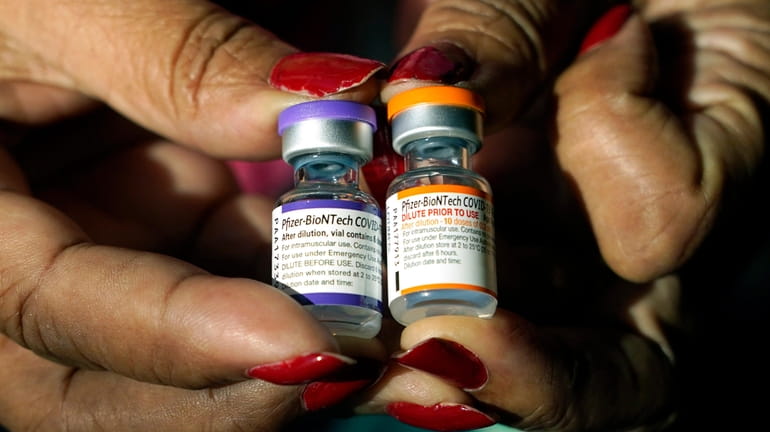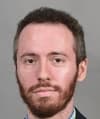FDA clears COVID booster shot for healthy kids ages 5 to 11

A nurse holds a vial of the Pfizer COVID-19 vaccine for children ages 5 to 11, right, and a vial of the vaccine for adults, which has a different colored label, at a vaccination station in Jackson, Mississippi, in February. Credit: AP/Rogelio V. Solis
Tuesday’s emergency authorization of Pfizer-BioNTech’s COVID-19 booster shot for kids ages 5 to 11 — a third dose — comes as most Long Island families have chosen not to have their kids vaccinated with even a single shot.
Fewer than one-third of Long Island kids ages 5 to 11 could now can get the booster, meaning they are fully vaccinated, according to Centers for Disease Control and Prevention statistics. So Tuesday’s announcement immediately covers about 76,000 kids on the Island out of a population that New York State says is about 231,000. (The number of those eligible to be boosted immediately is probably smaller than 76,000, because some of them may have gotten the shot less than five months ago. )
“I think a lot of families, and a lot of parents, are hesitant about getting their children vaccinated, so it will be difficult to get a large number of kids boosted considering the small number who already received two doses,” said Dr. Andrew Handel, a pediatric infectious diseases expert at Stony Brook Children's Hospital. In his practice he has encountered parents reluctant to allow their kids to be vaccinated with even one dose.
Tuesday’s authorization, an "emergency use authorization" issued by the Food and Drug Administration, OKs the vaccine booster for the 5-to-11 age group, but it’s not yet recommended. That decision is expected to be made later, with a panel of CDC science advisers scheduled to meet Thursday.
Meanwhile, vaccinators on Long Island are preparing for the booster, which provides additional protection against COVID after the original vaccine's has begun to wane with time.
At the Northwell Health system, boosters could be available as soon as the day after the necessary bureaucratic signoff by the state Health Department, which in the past has taken between a day and five days after the FDA authorizes the vaccine use, said Dr. Matthew Harris, Northwell’s medical director for its COVID-19 vaccine program.
He said Northwell was preparing in anticipation of that signoff and already had the necessary expertise, supplies and needles, and was educating staff on age eligibility criteria.
As with first, second and booster doses for already-authorized age groups, Northwell plans to offer the vaccines to the 5- to 11-year-olds mainly at providers’ offices, he said.
“Right now, we have a very limited, mass vaccination program, because the vaccines have really shifted to the primary-care setting and to pharmacies. But obviously, if the need arises, we are prepared to stand up the same structure we’ve used in the past,” Harris said.
Northwell, which in December 2020 gave the nation's first authorized COVID vaccine, is the state’s largest nongovernment vaccinator, Harris said.
In a news release following the FDA’s announcement, Gov. Kathy Hochul said: “I know this is particularly welcome news for parents and guardians all over New York who have been patiently waiting to give their children the extra-layer of protection that the booster dose provides against serious illness from COVID-19.”
Just over half of eligible New Yorkers are boosted, her release said.
As with their first and second doses, children ages 5 to 11 would get a dose consisting of a 10 microgram boost — one-third of the adult dose. The only exception: those who got the child dose at age 11 and have since turned 12. Parents can opt for such a child to get the full, adult dose. Regardless, in most cases the booster should generally be administered at least five months after a person is fully vaccinated.
Harris said although “the overwhelming majority of healthy children have a relatively mild course with the current strains of COVID, more than 1,000 children have died nationwide of COVID.”
“Albeit those children have been young folks with cancer, with underlying disease, those are people’s children,” he said.
According to the U.S. Census Bureau, the under-18 population of America is 73.1 million.
He said that anyone eligible for the vaccine who is immunocompromised — because of an underlying health condition such as cancer — especially ought to be boosted.
Sean Clouston, an associate professor and epidemiologist at Stony Brook University who studies population health, said that the boosters would help mitigate infections emerging from schools, particularly when kids interact with maskless or sicker adults.
Still, it’s unclear what impact the announcement will have on hesitant families.
“I’m not convinced that telling kids they need three shots,” he said, “will encourage those who have been reticent this far to get their first shot.”

